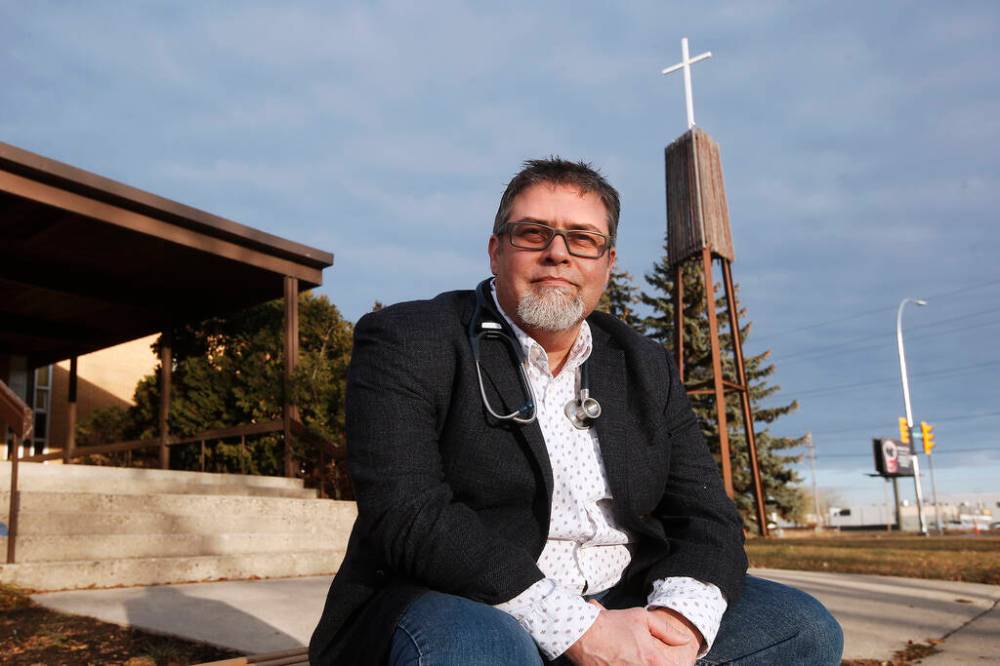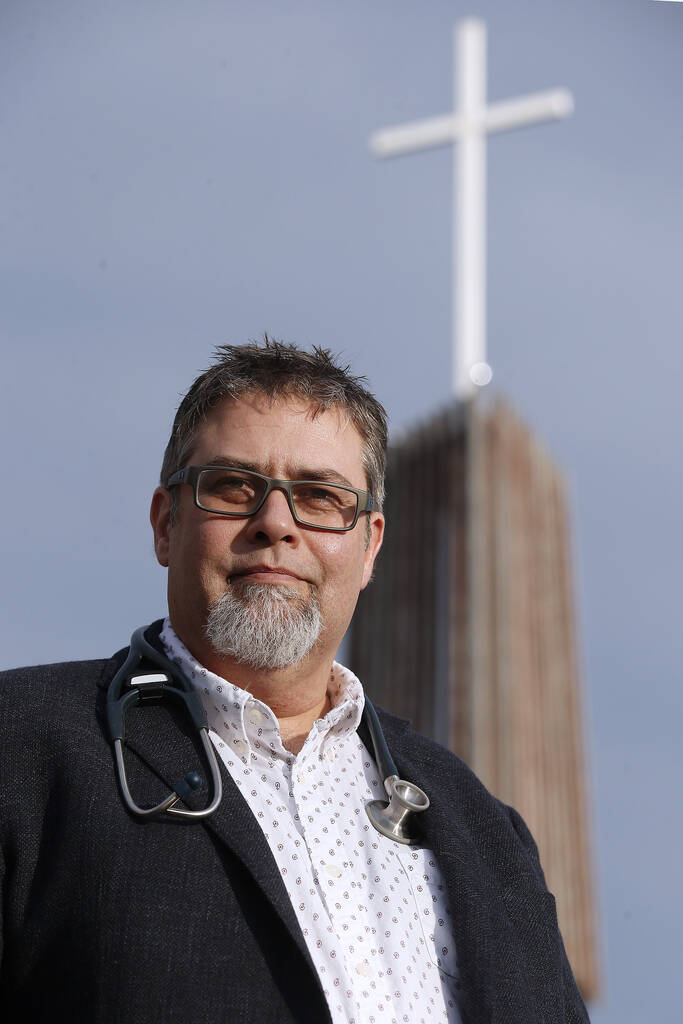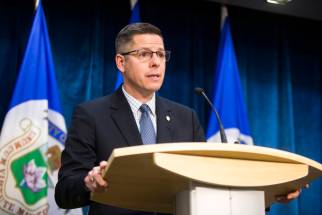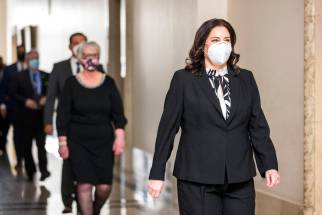Dying in hospital with dignity becomes struggle amid overflowing facilities: doctor
Read this article for free:
or
Already have an account? Log in here »
To continue reading, please subscribe:
Monthly Digital Subscription
$0 for the first 4 weeks*
- Enjoy unlimited reading on winnipegfreepress.com
- Read the E-Edition, our digital replica newspaper
- Access News Break, our award-winning app
- Play interactive puzzles
*No charge for 4 weeks then price increases to the regular rate of $19.00 plus GST every four weeks. Offer available to new and qualified returning subscribers only. Cancel any time.
Monthly Digital Subscription
$4.75/week*
- Enjoy unlimited reading on winnipegfreepress.com
- Read the E-Edition, our digital replica newspaper
- Access News Break, our award-winning app
- Play interactive puzzles
*Billed as $19 plus GST every four weeks. Cancel any time.
To continue reading, please subscribe:
Add Free Press access to your Brandon Sun subscription for only an additional
$1 for the first 4 weeks*
*Your next subscription payment will increase by $1.00 and you will be charged $16.99 plus GST for four weeks. After four weeks, your payment will increase to $23.99 plus GST every four weeks.
Read unlimited articles for free today:
or
Already have an account? Log in here »
Hey there, time traveller!
This article was published 16/03/2022 (1364 days ago), so information in it may no longer be current.
A Winnipeg palliative care doctor is demoralized that too many patients are spending their final hours languishing in stretcher areas of emergency rooms because hospitals are full.
“We are lacking the capacity to bring them somewhere where they can have care in a dignified location that allows quiet, compassionate, dignified care,” said Dr. Tim Hiebert, an internist who consults with emergency room staff at city hospitals and treats patients dying in the ER.
“Patients who have sudden, horrible events — like big strokes and big heart attacks, that can’t be rescued — or a surgical problem that can’t be operated on who will die because of their illness, we try very hard to provide them with dignified, compassion-based care and, if at all possible, to get them out of the emergency room,” the doctor said Wednesday.
“Of late, increasing numbers of patients are coming in, and we can’t.”

It is a disheartening situation, Hiebert said.
“Instead of going to a hospital ward, where this kind of gentle care can be provided, they wait in the emergency room in the stretcher area and they might wait for… days,” he said.
“There are no spaces in the hospital for them to go to,” said Hiebert, noting demand for Winnipeg’s 45 designated palliative care beds often exceeds capacity.
Patients who need end-of-life care may instead end up in emergency departments that are “very full and very busy,” with hospitals under further pressure due to the COVID-19 pandemic.
“Instead of going to a hospital ward, where this kind of gentle care can be provided, they wait in the emergency room in the stretcher area and they might wait for… days.”
– Dr. Tim Hiebert
In the past when a palliative care bed hasn’t been available, there were other places for such patients, he said.
“What we would be able to do the vast majority of the time is find some dignified place in the hospital where they could get care in a quiet location, where they can have some privacy with their family… It’s much more frequent right now that we’re struggling with not being able to provide that,” Hiebert said.
“It’s very hard for a person to die in a crowded space, when only a small number of visitors can come, if visitors can come at all, because of the realities of of the emergency room.”

The doctor said he was speaking up to let the public know about the situation, not to cast blame.
“Increasingly, Manitobans are dying in emergency rooms and no one wants this,” said Hiebert. “No one seems to be aware, outside of the people who provide the direct care.
“Emergency room staff do their best… but they’re doing it in the midst of a crowded, noisy environment where there isn’t any privacy or necessarily even room for the family to be visiting.”
Hiebert said it is stressful for all involved, and he himself feels “demoralized.”
“A person only dies once. A family will only go through losing their dad or their mom one time and they never forget it… We want to do the best we can for each one of these families, and it’s very difficult to do right now when we’re stuck in these so far-away-from-ideal situations.”
Shared Health has announced COVID-19 hospitalizations are dropping and it has contingency plans to deal with potential surges to staff-up critical care beds.
“Increasingly, Manitobans are dying in emergency rooms and no one wants this. No one seems to be aware, outside of the people who provide the direct care.”
– Dr. Tim Hiebert
On Tuesday, it released a seven-page “COVID-19 Health System Recovery Plan” for the addition of overcapacity and flex medicine beds to reduce congestion across the health system “and better support the timely transfer of patients from ICU to medical units to help preserve critical care capacity.”
Hiebert said there was no mention in it of the need for additional beds for patients in the ER who are at the end of their lives. He’s uncertain where the staff or the space will be found to add any more hospital capacity.
“If there’s another significant wave of people who require hospital care, we’re going to have a lot of difficulty providing care. It’s not simply about having enough ICU beds,” the doctor said.
“There are several others who need another level of care that still essential. When you only have a limited amount of resources, it can only go around so far,” Hiebert said. “It feels like we’re rationing care.”
Health Minister Audrey Gordon was not made available to comment Wednesday. Her press secretary referred questions to Shared Health.
Its spokesperson issued a statement saying: “Patients or families are encouraged to contact the appropriate site or region’s patient relations department to discuss any concerns relating to care that they may have.”
The recovery plan, the statement said, “provides a blueprint for restoring health services to pre-pandemic levels and the identification of opportunities to increase ICU and medicine capacity, improve patient flow and reduce congestion in our emergency departments.”
carol.sanders@freepress.mb.ca

Our newsroom depends on a growing audience of readers to power our journalism. If you are not a paid reader, please consider becoming a subscriber.
Our newsroom depends on its audience of readers to power our journalism. Thank you for your support.
History
Updated on Wednesday, March 16, 2022 11:52 PM CDT: changes stable care to gentle care in quote
Updated on Thursday, March 17, 2022 6:58 AM CDT: Fixes typo in pull quote









